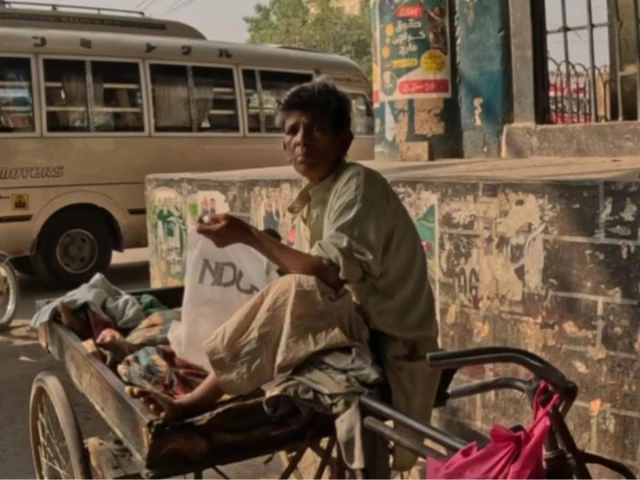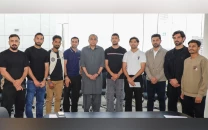Karachi woman dresses as man to support family
Wearing her brother’s clothes, driving a cycle-loading rickshaw, Rani Bibi says she chooses hard work over begging

In her brother’s shalwar kameez, and with her hair cut in a masculine style, a woman in Karachi has adopted a male appearance that allows her to work and earn for her family.
Rani Bibi (not her real name) even speaks less so that people perceive her as a man.
Though she lives in Khuda Ki Basti, Surjani Town, Rani drives a cycle-loading rickshaw every day for two hours, reaching Liaquatabad with her specially-abled brother.
There, she parks her conveyance near the market and delivers goods in it. If the load is light, she says, she will pedal the rickshaw. If the load is heavier, she pulls it manually.
Sometimes Rani receives two or more jobs a day, which allows her to earn Rs800 or more.
Living in a rented house with her specially-abled brother, widowed sister, and the sister’s two children, Rani is the sole earner for her family. Uneducated, she says she also does not know any specific skills, and so, purchased her cycle-loading rickshaw for Rs10,000 after saving up.
Her delivery of goods in Liaquatabad allows her family to sometimes eat once or twice a day, she says. Though sometimes the family even goes to bed hungry.
When asked why she, being a woman, adopted a male appearance, Rani says that in this society, if a woman has no skills, earning wages becomes very difficult, therefore, she adopted a male appearance out of necessity.
Rani says her brother used to drive the rickshaw, but had an accident and sustained an injury in his leg, which rendered him unable to work. Now, as he can’t operate the rickshaw, he accompanies his sister.
Rani adds that there is more dignity in earning through hard work than in begging. Asserting that no woman becomes a man out of choice, she says that social problems and hunger lead to a change in appearance.
“I am a woman, and if I am wearing male clothes and have changed my appearance to work, there is a blessing in earning lawful sustenance. I do not beg from anyone, nor do I appeal for help. Pray for me that I earn my living through hard work,” she states.
Advising helpless women, Rani counsels, “In circumstances of necessity, instead of going in the wrong direction or seeking help, turn toward the path of hard work. You will earn a livelihood, and your difficulties will become easier”.


1733130350-0/Untitled-design-(76)1733130350-0-208x130.webp)


















COMMENTS
Comments are moderated and generally will be posted if they are on-topic and not abusive.
For more information, please see our Comments FAQ